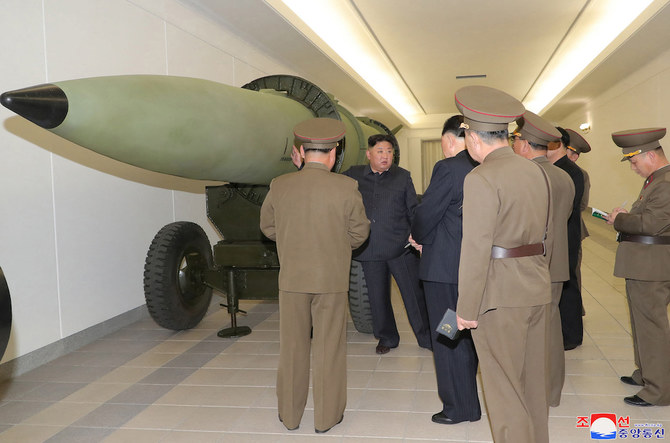
- ARAB NEWS
- 04 Jul 2025

As the number of nuclear weapons held by major powers is on the rise, the international community ought to put more effort into preventing the proliferation of these weapons and work toward their elimination.
It is estimated there are currently about 12,500 nuclear warheads around the world. The Guardian newspaper reported in June: “At a time of both deteriorating international relations and the escalation of nuclear saber-rattling, there are now said to be an estimated 12,512 warheads globally, of which 9,576 are in military stockpiles ready for potential use, up 86 on a year ago.”
Nuclear proliferation — the spread or acquisition of nuclear weapons and technology by additional countries or entities, as well as those that initially developed and tested such weapons — is becoming a greater concern for global security due to the potential consequences of the use of these weapons. The proliferation of nuclear weapons can also undermine international norms and agreements aimed at preventing their spread. The erosion of these norms could lead to a more uncertain and dangerous global security environment.
Although some scholars, policy analysts and politicians may argue that nuclear weapons can be seen as a means of deterring potential adversaries from attacking, one of the threats associated with their proliferation is that the existence and rising number of nuclear weapons creates a constant risk of accidental use, unauthorized access or escalations during times of conflict.
The risk of miscalculation also increases. False alarms, the misinterpretation of signals and technical malfunctions could all lead to unintended nuclear conflicts. It goes without saying that the use of nuclear weapons would have catastrophic humanitarian consequences, causing immense loss of life, severe injuries and other health effects, as well as displacement.
Long-term environmental damage should also not be underestimated. The detonation of a nuclear weapon causes long-lasting damage, including radiation contamination and nuclear fallout. In other words, a large-scale nuclear conflict would have severe and far-reaching environmental consequences, affecting ecosystems and the climate alike.
Nuclear proliferation is becoming a greater concern due to the potential consequences of the use of these weapons
Dr. Majid Rafizadeh
In addition, the spread of nuclear weapons to more countries increases the likelihood of their use and heightens geopolitical tensions. As a result, nuclear weapons can be a destabilizing factor in the world, meaning reducing their numbers would be a step forward in terms of enhancing global security.
Furthermore, the rising number of nuclear weapons in neighboring countries or regions can trigger arms races, with non-nuclear-armed nations feeling compelled to develop their own nuclear capabilities in response to perceived threats from others. Regional rivalries may contribute to a cycle of proliferation in this case. Some regions are of particular concern regarding nuclear proliferation due to geopolitical tensions. The Korean Peninsula and the Middle East, for example, ought to be the focal points of international efforts to prevent the spread of nuclear weapons.
The international community must also consider the potential for nonstate actors to acquire nuclear weapons as proliferation increases. The potential for nuclear weapons or material to fall into the hands of a proxy group or terrorist organization should be a grave concern. Nonstate actors acquiring and using nuclear weapons could result in devastating consequences, posing a significant threat to global security.
Finally, nations with nuclear capabilities may use their arsenals as a form of political leverage, engaging in nuclear blackmail or coercion to achieve strategic goals. This could lead to an increase in international crises and heighten the risk of conflict.
Therefore, the potential consequences of the use of nuclear weapons raise ethical questions about states’ continued possession of them and the moral responsibility to work toward their elimination.
Achieving complete global nuclear disarmament should be a critical and long-term goal for the international community.
The world can take several steps and adopt efficient strategies in order to progress in this direction. These include increasing public awareness of the risks associated with nuclear weapons and advocating for disarmament. Grassroots movements, civil society organizations and advocacy efforts play a vital role in raising awareness and pushing for policy changes. Fostering a global culture of peace and conflict resolution is vital in order to encourage nations to prioritize diplomatic solutions to disputes, invest in conflict prevention and build international cooperation to address the root causes of conflicts.
Other strategies include encouraging the ratification and implementation of the Comprehensive Nuclear-Test-Ban Treaty, which prohibits all nuclear explosions for both civilian and military purposes; renewing and negotiating new arms reduction treaties between nuclear-armed states, whether bilateral or multilateral; reinforcing and strengthening existing arms control agreements such as the Treaty on the Non-Proliferation of Nuclear Weapons in order to ensure compliance; enhancing verification mechanisms; and strengthening the role of international organizations in monitoring and verifying compliance with arms control agreements.
It is incumbent on the nuclear-armed states to take the lead by demonstrating their commitment to disarmament through unilateral or negotiated reductions in their arsenals. This can set a positive example for other nations and build momentum for broader disarmament efforts.
In summary, as nuclear proliferation rises, it is more important than ever to focus on disarmament, which requires sustained international political will, dialogue, cooperative efforts, diplomatic initiatives and a shared commitment to the principles of peace and security. Achieving this objective will contribute to a safer and more secure world, free from the threat of nuclear catastrophe.
• Dr. Majid Rafizadeh is a Harvard-educated Iranian-American political scientist. X: @Dr_Rafizadeh